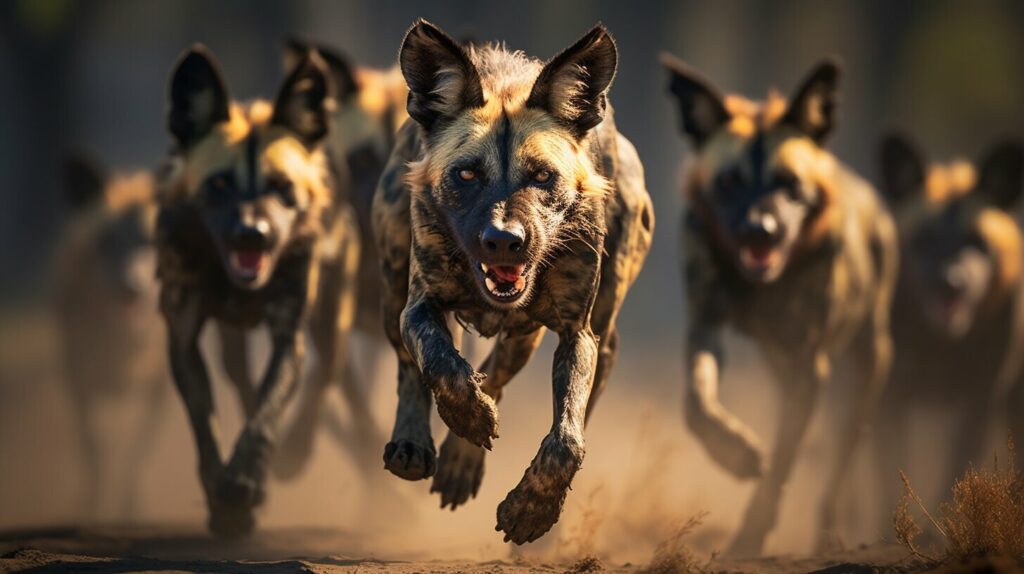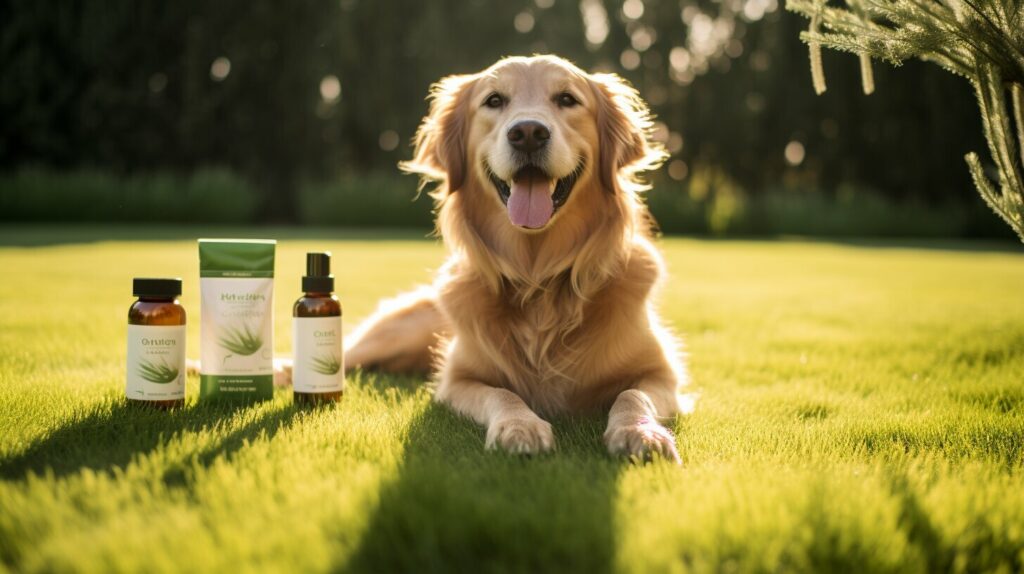If you’re fascinated by the wildlife of Africa, you won’t want to miss learning about the wild dogs from Africa, also known as African wild dogs or African hunting dogs. These unique canids are found in various habitats throughout the continent, from savannahs to woodlands to open grasslands. Their scientific name is Canis lupus africus, and they are one of the most endangered carnivores on the African continent.
Key Takeaways:
- Wild dogs from Africa are also known as African wild dogs or African hunting dogs.
- They are found in various habitats throughout the continent and are one of the most endangered carnivores on the African continent.
- Their scientific name is Canis lupus africus.
African Wild Dogs: An Overview
With their striking coat pattern of black, white, and brown, African wild dogs (also known as African hunting dogs or canis lupus africus) are some of the most distinctive predators of the African savannah. These highly social animals are renowned for their cooperative hunting tactics, intricate communication methods, and complex social structure.
Surprisingly, African wild dogs are not actually dogs, but belong to a separate genus called Lycaon. They are smaller than most other large predators in Africa, with an average weight of 55 pounds and a shoulder height of 30 inches. However, they more than make up for this with their remarkable endurance, which allows them to chase prey over long distances at speeds of up to 37 miles per hour.
African wild dogs are found in scattered populations across sub-Saharan Africa, but their numbers have declined dramatically in recent years. Habitat loss, disease, and persecution by humans have all taken a toll on these fascinating creatures, making them an important focus for conservation efforts in the region.
Pack Hunting Strategies of African Wild Dogs
When it comes to pack hunting, African wild dogs are the true masters. These fascinating animals are highly skilled hunters who use their cooperative tactics to capture prey and increase their chances of survival in the wild. As pack hunting dogs, they rely on their remarkable social skills and teamwork to take down prey much larger than themselves.
African wild dogs live in packs of six to twenty adults, led by an alpha pair who are the only ones to reproduce. The rest of the pack helps with the upbringing of the pups and the hunting of prey. The pack hunting strategy of African wild dogs is a well-orchestrated affair, with each member playing a specific role.
Before they begin to hunt, the dogs will gather together to carry out a pre-hunting ritual, which includes excited barking and chattering. This has distinct communication signals that help to increase group cohesion and provide motivational support to the pack. Once they are ready, they take off in a coordinated and swift manner, often covering long distances with ease.
When hunting, African wild dogs may chase their prey for several miles, wearing it down until it eventually succumbs to exhaustion. Unlike other predators, they do not typically go for the throat but instead focus on disemboweling their prey, which is a quicker and more efficient way of killing.
The success rate of African wild dogs when pack hunting is remarkable, with a 60-90% success rate, much higher than that of lions and hyenas who hunt mostly alone. This is mainly due to the high level of cooperation and communication between pack members. They have a great sense of awareness of their surroundings and can work together to create a coordinated attack plan, taking down prey up to 10 times their size.
In summary, the pack hunting strategies of African wild dogs are an impressive display of teamwork and coordination. They are an essential part of the African savannah ecosystem, and their hunting prowess as pack hunting dogs is unrivaled. It is crucial to preserve them for future generations to witness and appreciate their unique skills and behaviors.
African Wild Dogs’ Social Structure
African wild dogs are pack hunting dogs, also known as Canis lupus africus. They live in packs that can range from two to over 30 individuals, with a typical size of around ten. The social structure of African wild dogs is unique and complex.
Each pack is led by an alpha pair, which is typically the only breeding pair in the group. The other members of the pack are either young offspring or non-breeding adults. The alpha pair holds dominant roles and makes decisions for the pack. The pack members exhibit a high level of cooperation, and they communicate through a variety of vocalizations, including barks, whines, and growls.
Cooperative Hunting Tactics
The African wild dogs’ social structure is essential to their hunting success. They have a high hunting success rate of around 80%, which is due to their cooperative hunting tactics. The pack will work together to take down prey, with some members chasing the prey and others waiting for it to circle back. They also use vocalizations and body language to coordinate their efforts.
Importance of Cooperation
Cooperation is crucial to the African wild dogs’ survival, as they rely on each other for hunting, protection, and the care of their young. The pack’s social structure also helps to maintain genetic diversity within the species, as the breeding pair is usually unrelated to the other members of the pack.
Overall, the social structure of African wild dogs is unique and crucial to their survival as a species. By working together and relying on each other for cooperation, these pack hunting dogs have been able to thrive in the African savannah for thousands of years.
Habitat and Distribution of African Wild Dogs
African wild dogs are native to sub-Saharan Africa, with their range spanning across 39 countries. They can be found in a variety of habitats, including grasslands, savannas, woodlands, and even mountainous areas. However, they prefer to live in areas with a low human population and abundant prey.
Their range has significantly decreased over the years due to habitat loss and fragmentation, as well as human-wildlife conflicts resulting in persecution and poaching. According to the International Union for Conservation of Nature (IUCN), African wild dogs are listed as an endangered species, with only an estimated 6,600 individuals remaining in the wild.
African savannah predators like African wild dogs have an important ecological role in the ecosystem, as they help to regulate the prey populations and maintain the balance of the food chain. Their decline not only threatens their own survival but also has a ripple effect on the entire ecosystem they inhabit.
Endangered African Species: Conservation Status of African Wild Dogs
Despite their importance as top predators in the African savannah, African wild dogs are listed as an endangered species due to various factors that threaten their survival. These factors include habitat loss and fragmentation, human-wildlife conflicts, and disease.
African wild dogs require vast territories to roam and hunt, but as human populations increase and expand, their habitats become increasingly scarce. This reduces their access to prey and increases the likelihood of human-wildlife conflicts, including persecution by farmers and poachers. Additionally, African wild dogs are highly susceptible to infectious diseases, such as rabies and canine distemper, which can easily spread within their packs and decimate their populations.
Conservation efforts for African wild dogs are crucial for their survival as well as the health of the African wildlife ecosystem. These efforts involve creating protected areas, such as national parks and reserves, where African wild dogs can roam freely without interference from humans. They also involve working with local communities to promote coexistence between humans and wild dogs and to develop alternative livelihoods that do not involve directly harming wildlife.
Several conservation organizations, such as the African Wildlife Foundation and the Endangered Wildlife Trust, are leading the charge in protecting African wild dogs and other endangered African species. They conduct research and monitoring programs to better understand the behavior and population dynamics of wild dogs, as well as to identify and mitigate the threats they face. Additionally, they provide education and outreach programs to raise awareness about the importance of conserving African wildlife.
Preserving African wild dogs is essential not only for their survival but also for the overall health and balance of the African wildlife ecosystem. By supporting conservation efforts and promoting sustainable coexistence between humans and wild dogs, we can ensure a future where these unique and fascinating animals continue to thrive in their natural habitats.
Reproduction and Life Cycle of African Wild Dogs
If you are fascinated by African wild dogs, you might be interested in their unique reproductive behaviors. These pack hunting dogs are known for their highly social structure, which is particularly important during the breeding season.
The mating rituals of African wild dogs involve both male and female members of the pack, with the dominant male typically being the primary mate. Once pregnant, the female African wild dog will give birth to litters of around 6-12 pups after a gestation period of around 70 days.
Parental care is essential for the survival of these pups, and both male and female pack members will provide food and protection until the pups are old enough to join in the pack’s hunting activities. However, the survival rate of African wild dog pups is relatively low due to predation and disease.
Despite their unique reproductive behaviors and pack hunting lifestyle, African wild dogs face many threats to their survival, particularly habitat loss and fragmentation. Conservation efforts aimed at protecting this endangered species are crucial to ensure these fascinating creatures continue to thrive in the African savannah.
Interaction with Other Wildlife in Africa
African wild dogs interact with a range of other wildlife species in their ecosystem, both as predators and prey. As top predators in the African savannah, they hunt smaller herbivores such as antelopes, gazelles, and impalas, using their pack hunting strategies to increase their success rate. However, they also face competition from other predators such as lions, hyenas, and leopards, which can pose a threat to both their prey and their own survival.
In addition to competition, African wild dogs may also encounter conflict with larger predators when defending their territory or den sites. For example, they have been known to confront and chase off lions or hyenas that threaten their pack or pups. Such interactions can be dangerous for both the wild dogs and the other predators, as they may sustain injuries in the process.
African wild dogs also play a role in the ecosystem by serving as prey for other predators, such as crocodiles and large cats. Their abundance and distribution can therefore impact the population dynamics of other wildlife species in the region.
Threats and Conservation Efforts for African Wild Dogs
The African wild dog is an endangered African species, facing multiple threats to its survival. Habitat loss, fragmentation, and human encroachment on their natural range are the primary factors contributing to the decline of African wild dog populations. These factors have led to reduced prey availability, increased human-wildlife conflict, and the spread of diseases such as rabies and distemper that can decimate entire packs of African wild dogs.
While African wild dogs are protected by law in many African countries, enforcement is often poor, and poaching for their unique fur and body parts remains a threat. Furthermore, the negative perception of African wild dogs as pests and competitors for game is a significant hurdle to their conservation.
Despite these challenges, several conservation initiatives have been established to safeguard African wild dogs and their habitats. These programs include habitat restoration and management, anti-poaching patrols, and education and outreach campaigns to promote coexistence between humans and African wildlife. Moreover, the reintroduction of African wild dogs into protected areas where their populations had declined is a promising conservation strategy.
Conservation organizations such as the African Wildlife Foundation, the Painted Dog Research Trust, and the Endangered Wildlife Trust have been at the forefront of African wild dog conservation efforts, working with local communities, governments, and other stakeholders to develop sustainable solutions for protecting this iconic African species.
Research and Monitoring of African Wild Dogs
Understanding the behavior, population dynamics, and ecological role of African wild dogs is essential for their conservation. Research and monitoring programs play a crucial role in achieving this goal, providing valuable insights into the biology and ecology of this species.
Research methods used for African wild dogs include radio tracking, GPS collaring, camera trapping, and genetic analysis. These techniques allow researchers to study the group dynamics, movement patterns, and habitat use of wild dog populations. By tracking individual dogs, researchers can also gain insights into their hunting behavior, reproductive success, and interactions with other wildlife.
Monitoring programs are also important for assessing the status of African wild dog populations and identifying threats to their survival. These programs involve regular surveys of wild dog populations in different regions of Africa and monitoring their breeding success, mortality rates, and disease outbreaks.
The African Wild Dog Conservation organization is a notable group that conducts research and monitoring programs to protect wild dogs from Africa. This organization also works with local communities to raise awareness about the importance of wild dog conservation and provides education and training to prevent conflicts between humans and wild dogs.
By conducting research and monitoring programs, we can learn more about the complex world of African wild dogs and develop effective conservation strategies to protect these magnificent creatures and the ecosystems they inhabit.
Conclusion
Wild dogs from Africa, also known as African wild dogs or African hunting dogs, are fascinating and unique creatures that play a crucial role in the African savannah ecosystem. With their distinctive coat patterns, cooperative pack hunting behavior, and complex social structure, wild dogs from Africa have captured the interest and admiration of wildlife enthusiasts around the world.
However, African wild dogs are also an endangered species, facing a range of threats that put their survival at risk. Habitat loss and fragmentation, persecution by humans, and disease outbreaks are some of the main challenges that African wild dogs confront in the wild.
Conservation efforts are essential to protect the future of wild dogs from Africa and ensure their continued presence in the African wildlife landscape. Initiatives such as habitat restoration, anti-poaching measures, and disease prevention programs have shown promise in safeguarding African wild dogs and promoting their recovery.
As a responsible traveler and wildlife advocate, you can contribute to the preservation of wild dogs from Africa by supporting ecotourism operators that prioritize sustainable and ethical wildlife encounters, avoiding products made from endangered species, and spreading awareness about the importance of conservation efforts.
Let us work together to keep the intriguing world of wild dogs from Africa alive for generations to come.
FAQ
Q: What are African wild dogs?
A: African wild dogs, also known as African hunting dogs or canis lupus africus, are a unique species of wild dogs found in Africa.
Q: What are the physical features of African wild dogs?
A: African wild dogs are known for their distinctive coat patterns of patches of black, brown, and white fur. They have large rounded ears and a lean, muscular body adapted for endurance.
Q: Where do African wild dogs live?
A: African wild dogs prefer open habitats such as savannahs and grasslands. They can be found in several African countries, including Botswana, South Africa, Tanzania, and Zimbabwe.
Q: How do African wild dogs hunt?
A: African wild dogs are highly skilled pack hunters. They use cooperative strategies, such as chasing, cornering, and surrounding their prey, to increase their hunting success rate.
Q: What is the social structure of African wild dogs?
A: African wild dogs live in packs led by an alpha male and alpha female. They have a complex social structure, with dominant individuals and subordinate members that work together for the pack’s survival.
Q: Why are African wild dogs endangered?
A: African wild dogs are listed as an endangered species due to habitat loss, human persecution, and diseases such as canine distemper and rabies.
Q: What conservation efforts are in place for African wild dogs?
A: There are ongoing conservation initiatives focused on protecting African wild dogs, including habitat preservation, anti-poaching measures, and community education programs.
Q: How do African wild dogs reproduce?
A: African wild dogs have a complex reproductive system. The alpha pair in the pack usually mates, and the female gives birth to a litter of pups. The entire pack participates in raising and caring for the pups.
Q: Do African wild dogs interact with other wildlife?
A: African wild dogs coexist with other wildlife species in their ecosystem. They may compete with larger predators for resources, and occasional conflicts can occur.
Q: Why is research and monitoring important for African wild dogs?
A: Research and monitoring programs help us understand the behavior, population dynamics, and ecological role of African wild dogs. This knowledge is crucial for effective conservation efforts.
Q: What is the significance of preserving African wild dogs?
A: Preserving African wild dogs is essential for the future of African wildlife. They are a unique and important species that play a vital role in the ecosystem.



